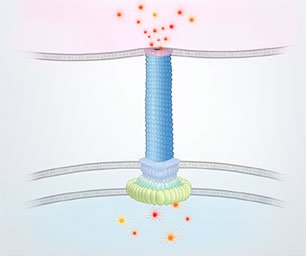BACTERIAL VIRULENCE

The bacteria P. aeruginosa uses a broad arsenal of virulence factors to establish infections. One of these, the Type III secretion system (T3SS), is thought to play a key role in the pathogenesis of acute P. aeruginosa infections. The T3SS is a secretion pathway used to directly deliver toxins into the cytoplasm of infected host cells. Despite extensive characterization, only six effector proteins of the P. aeruginosa T3SS have been identified to date: ExoT, ExoU, ExoS, ExoY, PemA and PemB (the last two were discovered by our group). The P. aeruginosa T3SS seems to have fewer effector proteins than any other well-characterized T3SS. This is especially intriguing in light of the ability of this bacteria to infect a wide range of hosts. We therefore hypothesize that other, as yet unknown, T3SS effector proteins are encoded in the genome of P. aeruginosa . Our group uses bioinformatic tools and machine learning algorithms (in collaboration with Prof. Pupko, TAU) to seek out potential novel effectors in various bacterial pathogens. We believe this study can deepen our understanding of virulence and host evasion mechanisms adopted by this versatile pathogen, and may provide novel approaches to treat these infections.
